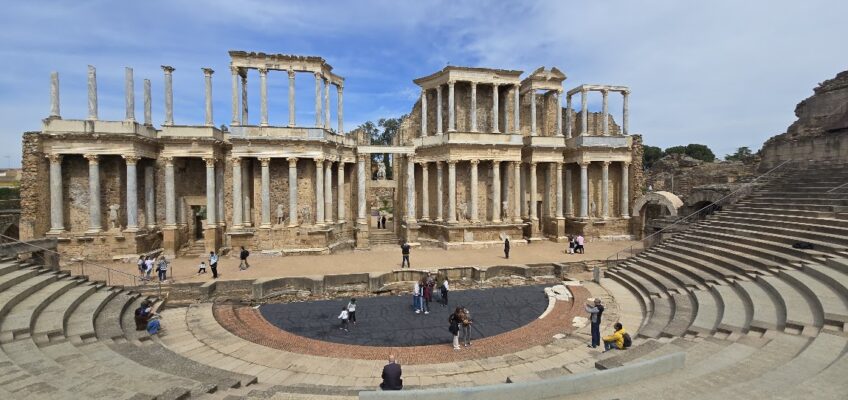In Mérida I learned about how Mérida got its name (and also how Mérida, Yucatan, got its name).
And in Carmona I enjoyed a hike.
Here’s a little more
Mérida
Mérida was our first stop after crossing into Spain from Portugal. I had no idea what to expect in Mérida. I had read nothing about it in advance.
The name
It turns out this was an important Roman settlement, founded by Emperor Augustus in 25 BCE. Its name was Colonia Iulia Augusta Emerita. The purpose of the city was as a retirement settlement for veterans of the Cantabrian Wars, which were the final stage of the Roman conquest of the Iberian peninsula. “Emerita” referred to the Emeritus soldiers, just as today it is used in academia for professors who retire with distinction.
You can probably already see how “Emerita” eventually became “Mérida.”
As for the Mexican city, read on.
The Roman ruins
The Archaeological Ensemble of Mérida consists of various remains of the Roman city: a large bridge over the Guadiana; an amphitheatre; a theatre (pictured at the top of this page); a circus (which we didn’t see, as it is outside the city); an aqueduct (which we also didn’t see); a temple known inaccurately as the Temple of Diana; and more.
There was a lot more interesting stuff to see in Mérida. I may have gotten tired of seeing Roman ruins in Rome, but this small sampling was impressive.
Mérida, Yucatan, Mexico
Spanish conquistadors founded the city of Mérida in 1542. They named it after the Spanish city because the Maya ruins they found there from the settlement of T’ho reminded them of the Roman ruins of Augusta Emeriti.
Carmona
Parador de Carmona
In Carmona we stayed in our first of three Paradores on this trip. A Parador is a government-run hotel, typically in a historic building or in a nature area with special appeal, and with a restaurant offering regional gastronomy. The one we stayed at in Carmona is, creatively, called Parador de Carmona. It is in a building from the 1970s that is modeled after the ruins of the adjacent Alcazar. And it was lovely.
Hike
Our group had an optional day trip to Seville. (Carmona is just about a half-hour drive from Seville.) Everyone except me opted in for that, but since I already spent five days in Seville back in February, I opted out. Laura, our trip leader, helped me plan a day in Carmona. I started with this hike.
I followed the red route, which was not as straightforward as it seems. There were no route markers for the first section, so I wasn’t even sure I was on the right path, and I took several wrong turns. It was also significantly more difficult than it looks on paper, at least for the first half, where it descended into a ravine and then back out on a dirt path that was rocky and uneven.
Once I got to the point where the red and yellow trails split, the route was clearer and the footing was easier. But the trail continued to ascend and descend, and at the end I had to climb back up to the town from far below. It wasn’t too difficult, but I was struggling. I think I need to do more hiking back at home so I don’t wear myself out so easily next time.
Take a look at some of the scenery. The profusion of wildflowers and the surrounding hills offered such a visual feast!
Post-hike
After the hike I took the rest of the day to explore Carmona, a pretty town. I visited the Museo de la Ciudad and the Roman Necropolis before stopping for lunch. Then I rejoined the group on their return from Seville to visit the Alcazar at the Seville Gate and a fun bodega where we sampled a local wine and watched Laura demonstrate her skills with the wineskin.
All in all, it was a very pleasant couple of days to start my fourth visit to Spain since starting this trip in February.
Photos
Here are my photo albums:



gail duree
And Laura was wearing WHTIE!!